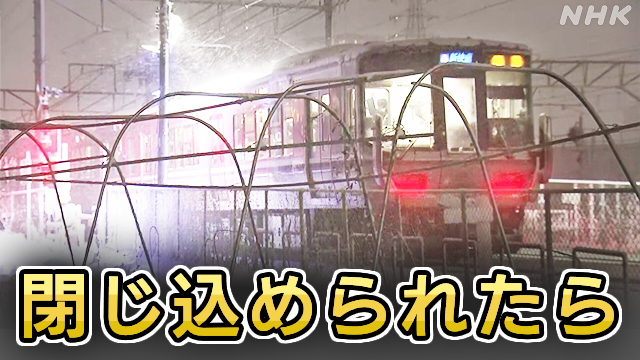7 hours on the train, what will happen to "I" at that time January 25th 21:36
A moving train suddenly stopped.
For the next seven hours, many people were trapped inside the car.
An event in the severe cold of once in 10 years.
This often happens during heavy snowfalls.
What happens to our bodies when this happens, and what can we do to protect them?
Here's what you need to know just in case.
24th at 7:20 pm
A man at Kyoto Station.
It was around 7:20 p.m. when he boarded the JR Kosei Line.
Yamashina Station is one stop away.
However, he couldn't even reach the station and the carriage got stuck in front of him.
Heavy snow is the cause.
Time passed by without moving.
As time passes, passengers gradually begin to move to cars with toilets.
Male passenger:
“For the first two or three hours, everyone was patient.
More and more people were getting sick.
Passenger Male:
“The inside of the train was almost out of oxygen.
"Hyperventilation, dangerous"
I was trapped in the vehicle for 7 hours.
There were other trains that could not move
due
to
snow .
There was a series of posts complaining about.
Also, another passenger told me what happened in the car.
Another passenger
said, ``The announcement in the car said, ``I requested that you let the customer out of the car, but I received a reply, 'Please don't get out.
"In response to that, various people made retorts, saying, 'Did you force yourself to do it in the end?'"
"My smartphone was about to run out of battery, so I borrowed the battery from someone nearby and charged it to 10%. "
I'm glad I got it and was able to contact my parents."
Although we gave up seats...
A train on the JR Sagano Line stopped working at Kyoto Station at 5pm with passengers on board.
Before long, people who were unable to sit on their seats and were standing began to sit on the floor little by little.
After 10 hours, around 3 am, biscuits and a bottle of tea were distributed.
A passenger, a 20-year-old student
, said, "I endured it for a few hours, but I was so tired and sleepy that I squatted down."
Also, on another train, some passengers were giving up their seats because they couldn't sit in their seats, but they gradually got tired and some people were transported by ambulance.
By noon on the 25th, 13 people were transported by ambulance due to the train being stuck for a long time.
(Fire fighting summary)
From confinement to fainting
What could happen to our bodies when we are stuck in a train for a long time?
Junichi Yamazaki, deputy director of Saiseikai Sakaiminato General Hospital in Tottori Prefecture, who specializes in cardiovascular medicine, points out the fear of losing the balance of the autonomic nervous system.
Dr. Junichi Yamazaki
: “For example, when a situation like this one continues for a long time, people feel 'uncomfortable. As a result, symptoms such as cold sweats and stomach pains may
occur.In
severe cases, you may faint and faint. It's called neuromodulated syncope."
Symptoms before syncope occur
Symptoms that occur before neuromodulated syncope include the following and require attention:
・Cold sweat or abdominal pain
・Headache
・
Feeling fluffy
Symptoms are more likely to occur in a crowded car than when sitting.
Dr. Junichi Yamazaki
: “The countermeasure is to sit down if you are standing, and if you have space, change your posture, such as lying down. And the important thing is to drink plenty of water and raise your low blood pressure. Most neuromodulated syncope recovers in a short period of time, often without sequelae.”
Possibility of "hyperventilation" from confinement
Mr. Yamazaki also pointed out that some people who became ill in this situation may have hyperventilated.
If you are trapped in a train for a long time, you may experience hyperventilation, in which you breathe in and out repeatedly due to anxiety and stress.
Symptoms caused by hyperventilation・
Difficulty breathing ・Pain
in
the chest
・Dizziness and palpitations
・Numbness in hands and feet, muscle spasms, etc.
Originally, people take oxygen into the body and put out carbon dioxide outside the body, maintaining balance in the body.
However, when hyperventilation occurs, the concentration of carbon dioxide in the blood becomes low, and various symptoms such as dyspnea appear.
The countermeasure is "slowly exhale"
To prevent this, Dr. Yamazaki says, "It may be difficult, but consciously breathing slowly is one of the countermeasures."
The website of the Japanese Respiratory Society also shows countermeasures.
- Deliberately slow your breathing.
・Hold your breath for a while.
Even if the symptoms are improved by doing this and the anxiety is so strong that it is not possible to slow down the breathing, I would like you to instruct me to breathe slowly and calmly as much as possible.
Although it's best not to encounter
Every year, trains get stuck in heavy snowfalls.
It's best not to be in such a situation, but it's also important to know what to do in case it happens, which may help you or someone you don't know around you.
(Kyoto Bureau, Chiharu Kinukawa, Network Press Department, Yuki Ishikawa, Hokuto Takasugi, Kaoru Hijikata)
*Symptoms such as fainting, cold sweats, and faintness may occur in various diseases other than neuromodulatory syncope.
If you are unsure, please consult a doctor.

